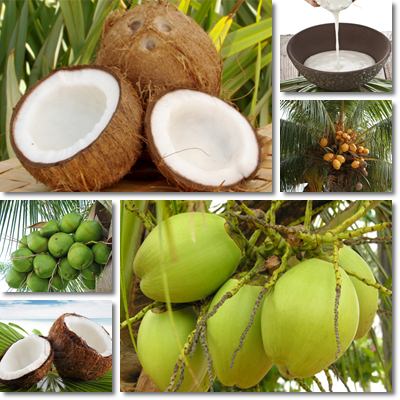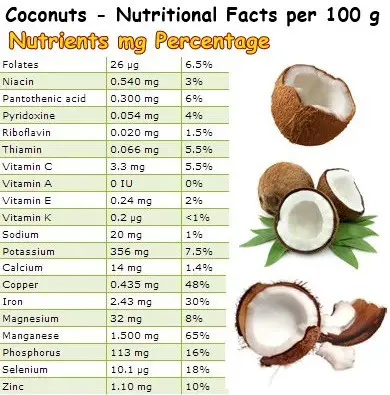The fruit of a subtropical palm tree, the coconut (Cocos nucifera) is known throughout the world for its refreshing taste and nutritious properties. When early Spanish explorers first laid eyes on the fruit, they called it ‘coco’, meaning monkey because to them they very much resembled the furry, brown animal. Overall, coconuts boast many properties and just as many uses in the form of coconut water, coconut milk, coconut oil and coconut flour.
In fact, coconut milk is quite nutritious and energizing, even more so than sports drinks with electrolytes and vitamins. Coconut flour is a great substitute for regular flour for anyone with gluten sensitivity or intolerance as it’s gluten-free, while the oil and butter make excellent moisturizing agents, ideal for dry skin and dry, damaged hair.

What do coconuts look like?
Coconuts are the large, dark brown, furry fruit of the coconut palm. Each coconut is made of a husk similar to that of walnuts, followed by a harder outer shell with three indentations that look like holes or eyes. The pulp inside is snow-white and filled with coconut water. The whole coconut should be full of water and when you shake it, you shouldn’t hear any liquid moving around inside. The three indentations on top of coconuts can be tapped to access the water inside, but this does not allow for you to inspect the quality of the fruit and see if it’s still good to eat.
What is coconut water?
Coconut water is the clear juice of the coconut fruit. Coconut water is a liquid loaded with essential vitamins and minerals, notably potassium, magnesium and sodium, and an important source of hydration. It is actually s much healthier than a lot of sports drinks catered to professional athletes and sports enthusiasts as it offers excellent support following intensive workout sessions, hence its popularity.
Note:
It’s recommended to always open your coconut to inspect the pulp inside. The pulp should be snow-white in color and any blemishes or tinges indicate the coconut may have gone bad, meaning the coconut water is not very good either. As for the white pulp, it has a hard texture and a neutral, fatty, sweet taste, indicative of a high fat and sugar content.
Coconut water as intravenous fluid?
According to the American Journal of Emergency Medicine, coconut water can even be used as an emergency intravenous fluid as a result of its good sugar, mineral and vitamin content and rehydrating properties. As the fruit matures, the liquid starts to solidify into what is known as a kernel or coconut meat. Hot water or even milk is passed through the kernel in order to extract the aromas, fats and other nutrients from it and obtain coconut milk.

What makes coconut water and oil healthy?
Think about this: the water inside a single coconut is intensively filtered by a complex root system, then transported up the trunk to reach the fruit. One coconut must be sufficiently nutritious to give life to another mighty tree. And in order to do that, it accumulates carbohydrates, sugars, fats, protein and fiber, as well as a variety of essential vitamins and minerals. You can draw the conclusions yourselves.
Coconut oil is just as healthy if unprocessed and consumed in very small amounts. According to various research papers, it possesses special polyphenolic compounds as well as oleic, linoleic and lauric acid, fatty acids with wonderful health benefits. For instance, all coconut byproducts show efficient activity against the influenza, herpes and HIV viruses. Impressive, right? Of all the dietary oil varieties, coconut oil is definitely one of the healthiest choices. It can be used just as regular oil, for frying or regular cooking and added to soups, stews, baked desserts and so on.
From an economic point of view, coconuts represent an important part of the global economy and have ensured the survival of almost a third of the world’s population. For generations, coconuts have been the main food source for people in India, Philippines, Malaysia, Thailand and numerous other countries worldwide. While for some of us the coconut is an enjoyable, exotic treat that we wouldn’t necessarily consider eating on a regular basis, for many others it is a staple food. But not only is it much more palatable than rice, corn or wheat, it also boasts a variety of impressive nutritional properties and health benefits.
What are the benefits of Coconuts?
See my list of the most interesting properties and health benefits of coconut and its byproducts:
Antiviral properties
Special compounds in coconuts have been found to be effective against viruses causing influenza, herpes, measles, hepatitis C, SARS and even HIV. However, this does not mean that eating coconuts prevents us from getting these viruses when exposed to them, nor does it equal a treatment. We still have to do our part and protect ourselves as much as possible to avoid infection or, in case of an existing infection, follow the treatment prescribed by our doctor.
Antibacterial properties
Compounds in coconut inhibit the growth of bacteria responsible for ulcers, urinary tract infections, throat infections, pneumonia, gum disease and tooth decay (by increasing nutrient absorption) as well as candida and gonorrhea. However, coconut as food does not constitute treatment for any of the listed conditions.
Antifungal properties
Compounds in coconut inhibit the growth of fungi causing yeast infections, ringworms, athlete’s foot, thrush, diaper rash and other similar fungal infections. Nevertheless, it is best to ask for professional medical advice when suspecting such an infection and talk with your doctor about what is the best treatment option for you specifically.

Benefits for skin and hair
Coconut oil is natural beauty secret no. 1. Coconut oil repairs frail hair, restoring its integrity and shine. Regular coconut oil hair masks help treat dry scalp and dandruff problems. Also, applying coconut oil on the scalp helps get rid of lice and lice eggs. Coconut oil moisturizes the skin and delays the installment of wrinkles and saggy skin. Due to its aggressive antibacterial properties, it helps relieve and treat skin problems such as eczema or psoriasis.
Boost in energy levels
As a result of a varied content of dietary minerals, essential vitamins and phytochemical antioxidants, a high sugar and fat content, coconut water and coconut milk support energy metabolism by providing instant energy, satiation and curbing cravings.
Benefits for sustained physical activity
Coconut water and milk provide support for sustained physical activity and promote performance as a result of their tonic, energizing action owed to a good value of essential nutrients. The electrolytes in particular (potassium, sodium) regulate blood pressure levels and coordinate nerve-muscle communication, while the fats and carbohydrates provide energy to muscles.
Good for weight management
Being easy to digest and low in calories, coconut oil, butter and other byproducts are converted into energy for the body to use, not stored as fat. They regulate pancreas activity and boost metabolism, all important factors for an efficient weight loss.
Benefits for blood sugar metabolism
Components occurring naturally in coconut and its byproducts contribute to regulating insulin production and improve blood glucose use. Raw coconut meat is an excellent source of dietary fiber (9 g/100 g of coconut meat), indigestible plant material which is believed to decrease the intestinal absorption of sugars, contributing to glycemic control. By regulating the release of pancreatic enzymes, coconut oil improves digestion, increases nutrient absorption and helps maintain a healthy pancreas.
Cardiovascular benefits
Coconuts promote cardiovascular health. The unsaturated fatty acids found in generous amounts in coconut oil and other byproducts protect the arteries from lipid oxidation damage and lower LDL cholesterol levels. Potassium and sodium regulate blood pressure, while the high water content contributes to good blood volume. For a healthy person enjoying a clean, varied and balanced diet, coconuts make a healthy food.
